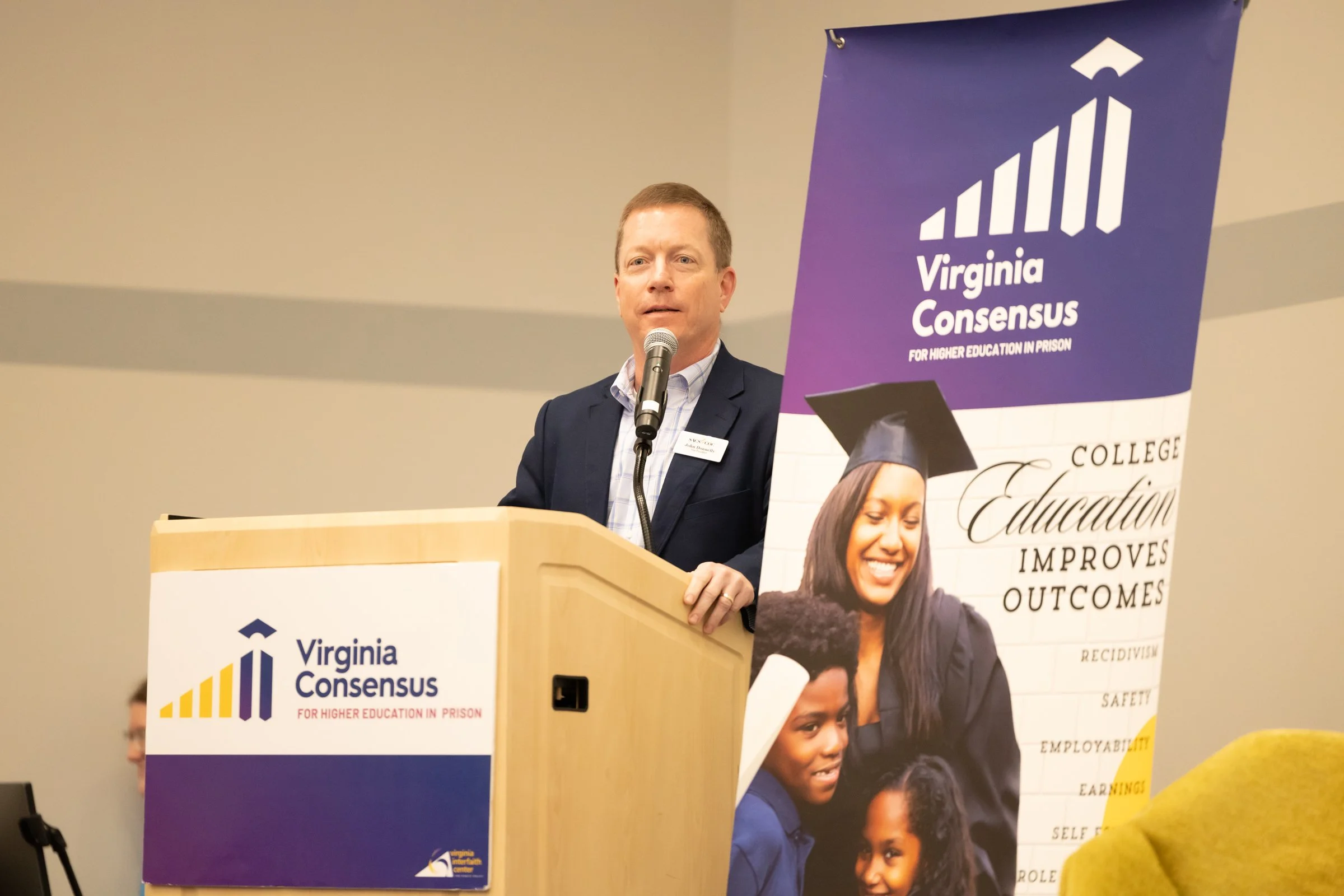Understanding Pell Grants in Prison Education
Pell grants help Americans with lower incomes pay for college. Restoring eligibility for Pell grants in 2023 for applicants who are incarcerated opened the door to real opportunities for attainment of postsecondary degrees behind bars. Virginians can now come home from prison with a college diploma in-hand.
To realize the full potential of this moment, it is essential for professionals in higher education and corrections – and those in public policy and state workforce agencies to understand how Pell Grant eligibility, accreditation and compliance work together to support the momentous opportunity at hand. This was the focus of the “Pell Grant Tutorials” panel at the inaugural “Building Consensus” conference, held July 17 at Brightpoint Community College, Chester Campus.
Dr. John Donnelly, Vice President at the Southern Association of Colleges and Schools Commission on Colleges (SACSCOC)
The session featured two experts: Sheila Meiman, Prison Education Specialist with the National Association of Student Financial Aid Administrators (NASFAA), and Dr. John Donnelly, Vice President at the Southern Association of Colleges and Schools Commission on Colleges (SACSCOC). The discussion was moderated by Sincere Allah, Virginia State Organizer with REFORM Alliance.
The presenters, both with experience running community college prison education programs, walked attendees through some of what it takes to build programs that are not just high-quality and impactful, but also remain compliant with the extensive federal regulations on Pell grants. A clear message emerged: strong, continuous communication and collaboration between colleges and departments of corrections is key.
Key Takeaways from the Panel
College Accreditation Applies to All Sites and Students
Colleges must uphold the same academic standards, rigor and access to resources in their prison education programs as they do on campus. Accreditation extends to every location and every student; prison walls are invisible for a college’s accreditation purposes.Prison Education Programs are federally approved and cannot be watered-down or substandard versions of the degree programs available to on-campus students. Federal student aid can be used to pay for both, and the educational product quality must be substantively similar.
Pell Grants Come with High-Stakes Compliance
Violations in how Pell funds are handled in prison education programs can jeopardize a college’s eligibility to receive federal financial aid across the board. Financial aid and corrections teams must proactively align on regulatory requirements, understanding and supporting their own and the other’s priorities.“A Pell compliance violation in prison education doesn’t just affect that program, it can take down the whole school’s eligibility. That’s why we must treat these partnerships with the seriousness they deserve,” said Meiman.
Compliance Requires More Than Common Sense
As Meiman emphasized, financial aid regulations are highly specific and governed by federal law, which doesn’t always align with everyday assumptions. Even well-intentioned decisions can lead to compliance issues if financial aid experts aren’t involved early in the process.
Data Security Is Paramount
New regulations, especially those under the FUTURE Act, impose strict limits on who can access sensitive student data. Prisons and colleges must develop secure, legal workflows to handle information sharing.
MOUs Must Be Detailed and Collaborative
Memoranda of Understanding (MOUs) between colleges and correctional agencies need to anticipate and define procedures for everything from semester disruptions to data access and student withdrawals -- any kind of issues related to potential compliance obligations.
As colleges and departments of corrections across the country continue to scale up postsecondary programs inside prison facilities, conversations like this are vital. Clear guidance, honest collaboration and careful planning can help ensure incarcerated learners receive the quality education they deserve, without unintended institutional risks.
Why Access Matters – For Everyone
Expanding access to higher education in prison isn’t just a policy priority, it’s a collaborative effort that benefits entire communities. When colleges, corrections agencies, policymakers and advocates work together, the result is not only smarter public investment, but also a more just and humane approach to rehabilitation and opportunity.
“One of the things that I found while incarcerated was that education, especially in the ‘90s, was stripped out of our system. So, the one thing that could help rehabilitate an individual was kind of taken away from us... It wasn’t until the late 2000s, when restorative justice started to take hold and Pell Grants were reintroduced, that it afforded us an opportunity to have college and postsecondary education, not just trades, inside the Department of Corrections in Virginia,” said Allah.
Whether you're an educator, policymaker, business leader or simply someone who believes in second chances, there's a place for you in the Virginia Consensus for Higher Education in Prison. By signing up, you’ll stay connected through our monthly newsletter, featuring news, resources, inspiring stories and updates from our growing network of partners.
Take one small step toward big impact. [Sign up here]

